1311 videos match your search.
 |
Alec Shedelbower Learn how to achieve more realistic graphics with physically based rendering (PBR) in the Wolfram Language. PBR is an approach to rendering that attempts to model the behavior of light ... |
 |
Jason Biggs This talk will showcase new functionality for working with the Molecule, a symbolic representation of a chemical species introduced in Version 12 of the Wolfram Language. Topics will include seamless integration ... |
 |
Jon McLoone This talk demonstrates a web-based application designed to automate the performance of DSE reviews built using Wolfram Application Server, explains the application architecture and discusses issues such as user authentication, ... |
 |
Paco Jain and Oleg Marichev This talk presents a new approach to fractional order integro-differentiation, possible thanks to a newly published function in the Wolfram Function Repository---ResourceFunction ["FractionalOrderD"]. |
 |
Jaebum Jung |
 |
Charles Pooh |
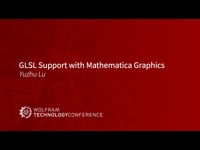 |
Yuzhu Lu Mathematica Graphics has a new experimental support for using existing OpenGL Shading Language (GLSL) files to customize 2D/3D graphics rendering through surface appearance. It has been used to develop ... |
 |
Keiko Hirayama and Jason Martinez Wolfram Language provides a wealth of computational tools for improving and maintaining health and fitness. Using Wolfram|Alpha Notebook Edition, we show the breadth of information available related to nutrition, ... |
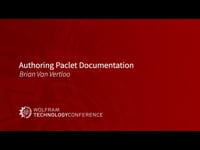 |
Brian Van Vertloo |
 |
Eric Dolores-Cuenca In our study of nonlinear Signal-flow graphs we used the software Mathematica to obtain evidence about new combinatorial identities. Eventually we proved those identities. |
 |
Oliver Grasl Automating state-of-the-art, multichannel content creation and delivery is a sophisticated and involved process. This presentation illustrates how Wolfram technologies can be used to pull content from diverse sources such as ... |
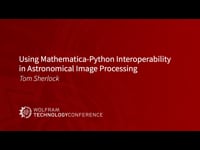 |
Tom Sherlock By using facilities built into Mathematica for calling into other languages like Python, one can leverage existing libraries and algorithms for performing specialized image processing workflows. |
 |
Jofre Espigule-Pons This talk will introduce the transformer machine learning model, which revolutionized the field of natural language processing. Then I will present M2M -100, the first multilingual machine translation (MMT) ... |
 |
Ming Hsu This presentation discusses validity challenges to AI algorithms and demonstrates the ways linguistical and social biases still pervade AI training. |
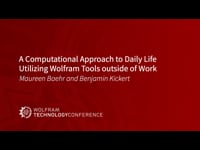 |
Maureen Baehr and Benjamin Kickert Mathematica and the Wolfram stack are well-known tools within professional settings from academia to the private sector. But how can these tools be leveraged to make life outside the office ... |
 |
Charles Macal Forecasting models for COVID-19 at the national and state levels have been common, but few account for transmission at city or smaller scales. In this talk, we describe two complementary ... |
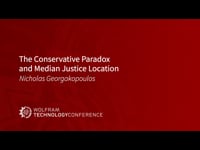 |
Nicholas Georgakopoulos This talk demonstrates how Mathematica establishes the existence of an unexpected phenomenon in a dataset; combines this dataset with a different one; explores alternative ways that 5-member coalitions may form ... |
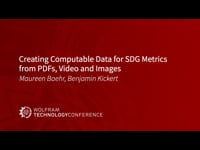 |
Maureen Baehr and Benjamin Kickert This talk discusses how the Wolfram stack has been used to advance sustainable development goal (SDG) metrics and further shows that various combinations of Wolfram tools allow for using nontraditional ... |
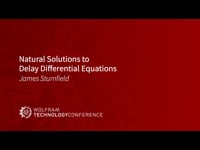 |
James Sturnfield This presentation illustrates the calculation of natural solutions for problems containing delay differential equations (DDE) with a single time delay for both linear and nonlinear equations, with and without starting ... |
 |
Maik Meusel This talk discusses the main challenges for educators in creating meaningful e-assessments and how to tackle these challenges using Wolfram Language. Based on concrete examples, we illustrate how open-ended and ... |